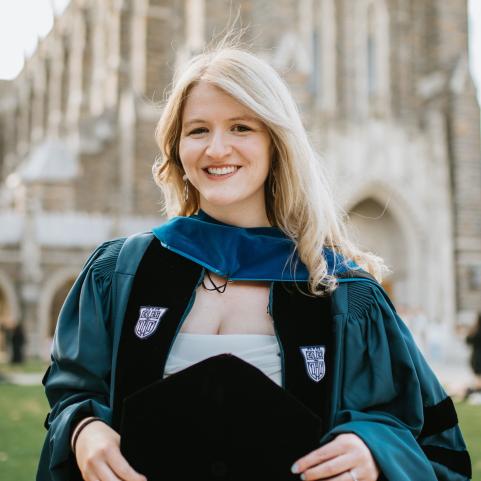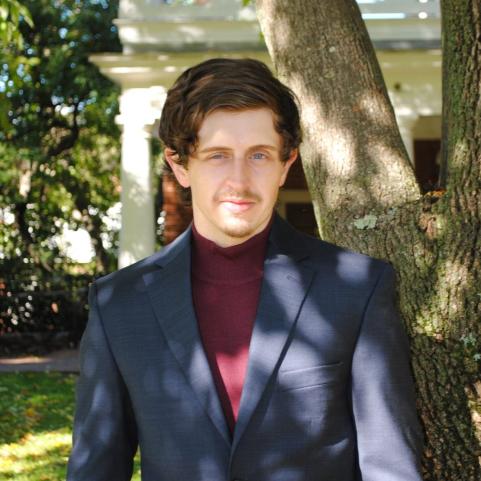BRAIN Postdoctoral Fellows
The Bold Research Advancement In Neuroscience (BRAIN) postdoctoral fellowship is a two-year opportunity for incoming postdoctoral researchers to build their careers at UVA through a personalized mentorship committee, targeted professional development resources, and financial support.
The BRAIN postdoctoral fellowship program awarded funding through 2025 and is now closed to applications.
Awarded Fellows

Elizabeth Wenzel, PhD – Psychiatry and Neurobehavioral Sciences
Mentor: Jennifer Payne, PhD – Psychiatry and Neurobehavioral Sciences
Dr. Elizabeth Wenzel is a postdoctoral fellow under mentorship by Dr. Jennifer Payne in the Department of Psychiatry and Neurobehavioral Sciences. She earned her PhD from the University of Illinois Chicago where she investigated how surging neuroactive steroid metabolites of progesterone in early pregnancy influence depression and anxiety symptoms in perinatal women. Her postdoctoral work with Dr. Payne will focus on stress experiences and hypothalamic-pituitary-adrenal axis functioning in women who develop postpartum depression with and without identified epigenetic biomarkers of hormone sensitivity and risk for postpartum depression. The goal of this work is to understand the underlying pathophysiology of different clinical phenotypes of perinatal depression, and to work with healthcare professionals to translate this work into clinically-feasible, novel methods of identification, prevention, and treatment of perinatal depression.

Yipkin Calhan, PhD - Biology
Mentor: Christopher Deppmann, PhD - Biology
Dr. Yipkin Calhan conducts research under the mentorship of Drs. Christopher Deppmann and Ali D. Güler in the Biology Department. His work investigates how brain-derived neurotrophic factor (BDNF), acting through its receptors TrkB and p75NTR, regulates the brain's adaptation to challenging energy environments, e.g., food abundance and scarcity. Employing approaches including single-cell proteomics, physiological assessments, and neurobehavioral studies, his objective is to map the precise neural circuits modulating eating behaviors in response to food availability. By unraveling these brain mechanisms of appetite control, this research advances the understanding of both eating behavior regulation and broader brain function, and may provide key insights into the treatment of eating and metabolic disorders.

Brianna Peskin Gifford, PhD - Biology
Mentor: Sarah Kucenas, PhD - Biology
Dr. Brianna Peskin Gifford received her PhD from Duke University where she investigated how segmentation of the notochord sheath serves as a blueprint for vertebral body formation during spine morphogenesis. Now, as a postdoctoral fellow in the Kucenas lab, Brianna is excited to investigate developmental patterning in a completely new way. Her project is focused on understanding the cellular and molecular mechanisms that govern oligodendrocyte progenitor cell (OPC) tiling in the central nervous system (CNS). During development, OPCs must spread evenly throughout the CNS to establish discrete, non-overlapping territories. However, the mechanisms that regulate OPC tiling remain unclear. Utilizing molecular biology, genetics, and live confocal microscopy techniques, Brianna will investigate how OPCs integrate cues from neighboring cells to migrate and space apart from one another in the spinal cord. This research will elucidate how glial-glial interactions guide nervous system patterning and will provide insight into therapeutic targets for hypomyelinating and demyelinating diseases.

Shan Jiang, PhD - Neuroscience
Mentor: Harald Sontheimer, PhD - Neuroscience
Dr. Shan Jiang is a postdoctoral fellow in the Sontheimer lab in the Department of Neuroscience. Shan earned her doctoral degree in Electrical Engineering from Virginia Tech. Her research at Virginia Tech focused on the development of implantable three-dimensional multifunctional neural probes equipped with modalities for electrophysiology recording, optogenetic stimulation, and drug delivery. Following the completion of her PhD, Shan continued her work at Stanford University, where she developed a non-invasive sono-optogenetic stimulation technique. This technique involves intravenously administrated mechanoluminescent nanoparticles, and the light emission for optogenetics stimulation is gated by focused ultrasound. In her current role in the Sontheimer lab, Shan aims to apply the biomedical technologies she has developed to address pressing challenges in various neurological diseases, including epilepsy, Alzheimer’s disease, and glioma. Her goal is to contribute to both basic research and the potential translation of these advancements to benefit human patients in the future.

William Mills III (Tré), PhD - Neuroscience
Mentor: Ukpong Eyo, PhD - Neuroscience
Dr. William Mills (Tré) joined the laboratory of Ukpong Eyo in June 2021. His research aims to understand how myeloid cells in the brain contribute to basal cerebral blood flow and neurovascular coupling. He utilizes in-vivotwo-photon microscopy techniques to image the same blood vessels following global and focal myeloid cell ablation, as well as genetic ablation of vasoactive molecules from myeloid cells. Furthermore, Tré is seeking to determine if microglia contribute to capillary demise and reduced cerebral blood flow (CBF) in Alzheimer’s Disease (AD). His research will help uncover basic mechanisms of cerebral blood regulation as well as potentially shed light on therapeutic targets that could slow or prevent capillary demise and CBF deficits in AD.

Ben McGartland Newman, PhD - Psychology
Mentors: Jack Van Horn, PhD - Psychology & Data Science | Jason Druzgal, MD, PhD - Radiology
Dr. Ben McGartland Newman is performing his postdoctoral research under Dr. Jack Van Horn and Dr. Jason Druzgal into the development and application of multiple novel diffusion MRI biomarkers to track sub-cellular changes in the brain. The diffusion microstructural method I developed during my doctoral research allows for the quantification of extracellular water, a key marker of neurodegenerative atrophy and neuroinflammation, as well as markers of axonal integrity and intracellular bodies such as neuronal somas or activated microglia. My recent work has expanded these biomarkers to more closely match sub-cellular structure with neuronal function and has enabled the estimation of axonal g-ratio and axonal conduction velocity from structural and diffusion MRI. Neuronal structure is an essential constraint on neuronal functioning, and by measuring and tracking changes in the cells of the brain using non-invasive MRI we can gain new insights into the neurological underpinnings of brain development and disease. These measurements have been applied to further our understanding of adolescent development, aging, Parkinson's Disease, and Autism.